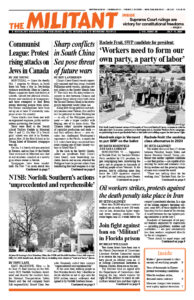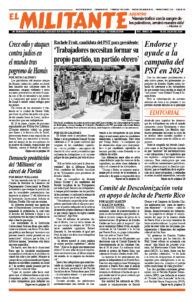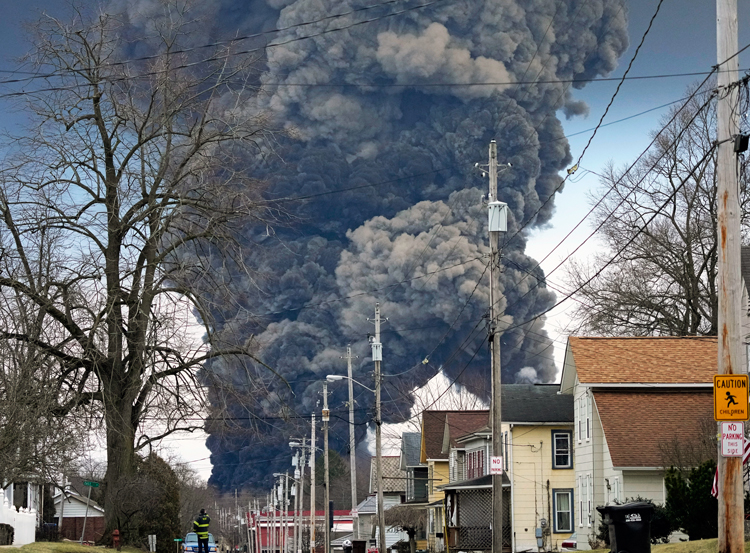EAST PALESTINE, Ohio — In its June 25 final hearing on the February 2023 Norfolk Southern derailment and disaster for residents here, the National Transportation Safety Board said the rail company bears full responsibility. Board Chair Jennifer Homendy called their conduct “unprecedented and reprehensible.”
At the same time, working people in East Palestine faced a July 1 deadline to decide whether or not to sign onto the $600 million lawsuit settlement deal agreed to by Norfolk Southern bosses.
“They’ve done nothing to prevent this happening again,” Jami Wallace, president of the Unity Council for the East Palestine Train Derailment, told the Militant. Wallace was one of a number of working people from the area who attended the hearing and two NTSB-sponsored community meetings. She pointed to the board’s conclusion that Norfolk Southern officials delayed in providing emergency responders crucial information on what cargo — including dangerous chemicals — was on the train. “Every firefighter in the U.S. should be outraged by this,” she said.
Representatives from three rail workers’ unions attended the hearing — the International Association of Sheet Metal, Air, Rail and Transportation Workers-Transportation Division, the main union representing train conductors; the Brotherhood of Locomotive Engineers and Trainmen; and the Transportation Communications Union-Brotherhood of Railway Carmen.
NTSB results point the blame
The drive by bosses at Norfolk Southern and other rail carriers to cut crew size, run with schedules that wipe workers out and destroy their families, and to slash inspections, maintenance and other key safety measures was behind the disaster, the unions have explained. The NTSB report backs them up.
As part of their fight to force out the truth and hold the company responsible, Wallace and others have criticized the lawsuit settlement. “All the expenses that the railroad paid for when we were evacuated, like hotel rooms, will be subtracted from your portion,” Chris Albright, a residential gas pipeline worker and member of the Laborers union, told the Militant, “That means we would get $35,000. That’s nothing.
“I got very sick from the derailment and am now fighting to get my job back,” he said. “Our central fight is for lifetime health care.”

“I don’t know, if you don’t take this, what’s your other option going to be?” local resident Linda Murphy told the Pittsburgh Post-Gazette, “Norfolk Southern gets what Norfolk Southern wants. They are a Goliath, and they will roll right through this, just like their train rolls through people’s towns. They have little or no concern for the damage they leave behind.”
The Washington Post reported that a new study shows that pollution from the East Palestine train derailment and “vent and burn” of dangerous vinyl chloride tank cars rained chemicals down in 16 states. “There’s more going on here than most people would have guessed, including me,” said David Gay, lead author of the study. The NTSB report said the vent and burn was “based on incomplete and misleading information provided by Norfolk Southern officials and contractors.”
On its website, the Brotherhood of Locomotive Engineers and Trainmen explained that “the vent and burn strategy was the quickest way to reopen the tracks. BLET Vice President Randy Fannon told the Associated Press, ‘When you’ve got 35 or 45 trains sitting and waiting to get through one area, no way to get around it.’”
Another major factor in this disaster — as well as in the 2013 derailment and fire in Lac-Mégantic, Quebec, that killed 47 people — was the bosses’ profit-driven insistence on using tank cars prone to crack on impact to carry dangerous cargo. These cars — known as DOT-111 cars — are scheduled to be phased out, but not until 2029.
Homendy said the NTSB has been urging these cars be taken out of service since 1991. The transportation and chemical industries have resisted.
“The lifespan of these rail cars can be 20 to 30 years,” said Robert Sumwalt, former NTSB chair, pointing out the rail companies want to get their full value out of them. “If you bought a tank car in 2014, you’re planning on phasing that out in 2034.”
When the train derailed in East Palestine, three DOT-111 cars with combustible materials, including one carrying highly flammable and toxic butyl acrylate, ruptured, starting a raging fire. “The vent and burn could have been avoided had there been no DOT-111 tank cars carrying combustible and flammable liquids on this train,” NTSB representative Paul Stancil said. There are 25,000 of these cars in use today.
The NTSB report concluded a failed wheel bearing on one of the cars that was detected too late caused the derailment. But why?
Job cuts, bosses disdain
“Under Precision Scheduled Railroading, the railroads have boosted profits by cutting the workforce by nearly a third over the past seven years,” BLET President Eddie Hall explained in a statement distributed at the hearing. “As a result, they have reduced the number of thorough inspections of rail cars, along with other service cuts.”
“The cutting down of inspection times to 30 seconds per side of a car,” made detecting problems in the cars more difficult, Jason Cox, national representative of the Transportation Communications Union-Brotherhood of Railway Carmen, told the Militant.
“After its departure from Madison, Illinois, the entire train wasn’t inspected before the derailment, despite traveling over 600 miles and passing several stations with qualified carmen,” Cox said.
Hall also pointed to the bosses’ “overreliance on technology.” Wayside detectors, which are supposed to measure wheel bearing temperatures and sound an alert if they’re hot, “shouldn’t substitute for rail workers conducting thorough inspections,” he said.
Jared Cassity, SMART-TD national safety team director, had told the NTSB that the train “should have stopped when the first elevated temperature was detected. Prior to 2021, the crew would have received an audible alert.”
The hearing also documented how Norfolk Southern job cuts meant only one worker was assigned to monitor all the wayside detectors on the railroad’s 19,500 miles of track that night. He was working “solo” on a computer at home, on a 12-hour shift, with no scheduled lunch break or time to use the bathroom.
He told the NTSB that when the bearing alert came through on the train nearing East Palestine, “Honestly, I didn’t see it when it first came in. There were three other trains I was working on.” These alerts are not sent to the train’s operating crew or the train dispatchers the crews work with.
Overall, the report from the NTSB — which has no enforcement power — is a damning picture of responsibility by Norfolk Southern bosses, a result of their drive for profit at all costs. Rail workers and their unions need to take the lead in a fight for control over all aspects of their work to protect themselves and those who live near the tracks.


